Thai regime tries to deny reality as coronavirus crisis worsens
Also in this edition: Coup rumours are still swirling, police crack down violently on protesters, another former ultraroyalist switches sides, and more...
Welcome to the latest Secret Siam weekly news roundup. If you find it useful, please support my journalism by subscribing. It’s just $5 a month, or less if you pay annually, and your subscription would really make a difference by allowing me to focus more time and resources on my investigations. To those who already subscribe, many thanks for your support!
Now onto the week’s news…
Prayut’s parallel universe
The fourth wave of the coronavirus has still not been brought under control in Thailand. Confirmed new cases are approaching 20,000 a day, and several hospitals say they are overwhelmed. The Ministry of Public Health says daily cases could climb above 40,000 and daily deaths exceed 500 by September.
Lockdown measures in Bangkok have been extended to the end of August, which will cause even more economic pain for hundreds of thousands of small businesses. Thailand is forecast to have the worst economic performance in southeast Asia this year and may have a second consecutive annual contraction in GDP for the first time since the Asian economic crisis of 1997 and 1998.
In a news conference last week, Somsak Akkasilp, director general of the Department of Medical Services at the Ministry of Public Health, admitted: “I am speaking frankly — we do not have enough beds in hospitals.”
An image from Ban Paew district hospital in Samut Sakhon, posted on Facebook by a doctor who works there, shows a row of people infected with the coronavirus lying on stretchers outside the building, waiting for beds to become available.
Other hospitals are openly publicising the fact that they are no longer able to cope with the number of patients.
But the Thai regime seems to be more concerned about denying reality and defending its reputation than working harder to combat the pandemic.
In an emergency decree published in the Royal Gazette last Thursday, the regime escalated its already aggressive censorship of anyone trying to tell the truth, banning “reporting news or disseminating information that may frighten people, or intentionally distorting information to cause a misunderstanding about the emergency situation, which may eventually affect state security, order or good morality of the people”.
The decree is explicitly designed to stifle news that is true. There is no other need for it — the draconian computer crimes law already enables harsh penalties for spreading false information, and the regime is also using the lèse majesté law against to try to shut down discussion of the role of the palace in the debacle. The latest decree allows the regime to silence anybody accurately reporting the government’s failings, by claiming the news will alarm the public.
As Sunai Phasuk of Human Rights Watch observed:
I think the government realises it is now facing a credibility crisis because of this disastrous response to the Covid situation, but instead of trying to find better solutions, more efficient solutions, it chooses to gag anyone from speaking about its failures. This provision doesn’t care about accuracy or whether it is true or false.
Pravit Rojanaphruk was also scathing about the new rules in his weekly column for Khaosod English:
If you cannot control COVID-19 outbreak, then try controlling people’s perception about the outbreak instead. This is what the government of Gen Prayut Chan-ocha is desperately trying to do…. If you are worried about real news that may create panic and destabilize the government, you should work harder to get quality vaccines and not waste time and manpower by trying to control the plot through censorship and instilling fears among journalists and social media users.
For once, Thai journalists have mounted a robust response to the new restrictions. The National Press Council of Thailand, the News Broadcast Council of Thailand, the Thai Journalists Association, the Online News Providers Association, the Thai Broadcast Journalists Association and the National Union of Journalists of Thailand have all demanded the revocation of the decree. In a joint statement they said:
The clause ‘news that may cause public fear’ allows authorities to proceed with legal action against the media and the public without clear criteria. Even if the public or media share factual information, state agencies may use this clause as grounds to file a complaint or threaten them.
Meanwhile, Prayut has been avoiding answering journalists’ questions for weeks but gave a fake interview to a member of his own advisory team which was posted on social media. This enabled him to give rehearsed answers and focus only on issues he wanted to discuss. Most of the interview was taken up with excuses and attempts to claim the Thai government had not made mistakes because the situation was even worse in some other countries:
If we contemplate the transmission in our country, it may seem shocking, given the daily fatalities. I want you to try paying attention to these numbers in our neighbouring countries and others for a change. At present, every country in the world has more or less felt the impact. There are many top-ranking countries, as you can see, whose numbers are many times higher than ours.
Prayut also defended the emergency decree banning news that could cause public fear, claiming that it was inaccurate and dangerous to report that the government’s performance had been poor.
There are some people who distorted information and caused confusion. If you receive the information and just think about it all by yourself, analysing it, talking about it and criticising it as you like, this is dangerous, making it seem like the system was not good.
It’s not just Prayut who is trying to deny reality. Health minister Anutin Charnvirakul insisted that Bang Sue Grand Station was not dangerously crowded with vast crowds seeking be to vaccinated amid a total lack of social distancing measures, despite obvious photographic evidence to the contrary. He claimed: “Camera angles or whatever can make a place look crowded.”
In even more extraordinary comments, Tipanan Sirichana, who works in the office of the prime minister’s secretariat, claimed last week that photographs showing people dying in the streets, with their bodies left lying there for hours, were fake and had been staged by opponents of the regime. Police then announced they would prosecute anyone pretending to fall down dead in public.
Under the new emergency decree, articles like my detailed analysis last week of the regime’s coronavirus policy failings and the role of the palace in the debacle are forbidden. The article also violated the lèse majesté and computer crimes laws, but fortunately I am not in Thailand so regime censorship does not really affect me. It remains to be seen if the government will try to block Secret Siam.
Craig Keating, a former senior analyst with Australia’s Office of National Assessments, has published a good analysis of Thailand’s coronavirus disaster that makes many of the same points as my own article. Presumably Keating’s analysis is now illegal in Thailand too under the new decree. As Keating explains, “the seriousness of Thailand’s COVID crisis likely lies in three early government decisions”:
Its decision to contract with Siam Bioscience — a company owned by King Vajiralongkorn with no experience in making vaccines — to make the AstraZeneca vaccine under licence probably delayed the supply of vaccines in the large numbers needed.
It greatly underestimated the number of doses needed, and failed to learn from other countries’ experiences when faced with the Alpha and Delta variants.
It chose as its sole alternative vaccine, Sinovac, produced by a Chinese company that is 15 percent-owned by one of Thailand’s richest men, but which proved to be less effective against the Delta variant than either European or US vaccines.
Fewer than six percent of Thais have been fully inoculated. The vaccine situation has been slightly improved by the donation of 2.5 million Pfizer doses by the United States and 415,000 AstraZeneca doses from UK. Trust in the Thai regime is so low that health workers rallied at the American embassy last Tuesday to ask US officials to monitor the distribution of the donated doses to ensure they were given to medical personnel and vulnerable Thais rather than taken by cronies of the government and military.
The government is haemorrhaging so much support that an intervention by the palace to install a new regime is looking increasingly possible. Comments by the outspoken far-right royal Chulcherm Yugala, which I highlighted in last week’s newsletter, have heightened rumours that the palace favours regime change. As Bangkok Post assistant news editor Chairith Yonpiam wrote:
Given his senior royal status, the prince's criticism has triggered wild speculation over a possible new prime minister endorsed by the palace… It could be argued that a palace-endorsed PM is the last hope for the right-wing conservative camp in their efforts to maintain power.
The military and government are having to repeatedly deny a coup is imminent — something that usually tends to happen at times a military takeover is indeed being planned. One state official has been detained for spreading coup rumours.
The journalist Marwaan Macan-Markar, who has been based in Thailand for decades and is close to old-school royalists like Anand Panyarachun, discussed the talk of a coup in an article for Nikkei Asia, observing: “By mid-July, as the economy continued to flounder, the possibility of a coup had moved from social media chatter to serious discussions in elite business circles.”
He quoted Kan Yuenyong, executive director of Siam Intelligence Unit: “The calls for a coup first came from the right wing camp of Thai politics. They feel that the country needs an absolute regime to clean up Thailand's health and political problems.”
Macan-Markar’s analysis is, as usual, undermined by his fear of even mentioning the role of the monarchy in all this, but it shows the extent to which regime change is being discussed in conservative royalist circles.
It’s unlikely the palace will make a move yet to install a new regime, while the Delta variant remains rampant and sufficient vaccine doses are still months away from arriving.
The most sensible moment to intervene will be when the latest wave of the virus has peaked and is in decline, and large vaccine orders from Pfizer, Moderna, and Johnson and Johnson are close to being delivered.
If a new regime is installed then, it could claim credit for all the subsequent success in containing the pandemic and reopening the economy, while Prayut and his cronies will be scapegoated for all the failures of 2021, and abandoned by the palace now that they have outlived their usefulness.
Police crack down after car mob rallies
The latest “car mob” protests calling for Prayut to step down were held in more than 30 locations around Thailand on Sunday.
In Bangkok, several protest groups joined forces with the original organiser, veteran activist Sombat Boonngarmanong. The Ratsadon movement took part, and so did a group of Red Shirts led by Nattawut Saikua, as well as We Volunteer activists and members of the gender equality organisation Seri Toey Plus.
They set out from five different locations around the city and converged outside the 1st Infantry Regiment compound on Vibhavadi-Rangsit Road where Prayut lives.
Nattawut’s decision to get involved in the protest movement is an interesting development. His old Red Shirt comrade Jatuporn Prompan has also set up a movement seeking to bring down the government, but the two men are no longer close and appear to have quite stark ideological differences. Erich Parpart at Thai Enquirer published a useful interview with Nattawut last week.
After the end of Sunday’s official car mob rally in Bangkok, groups of hardcore protesters remained at Din Daeng and on Vibhavadi-Rangsit Road, skirmishing with police who launched another violent crackdown.
Police used water cannons, fired tear gas from elevated positions which can cause serious injury, and shot plastic bullets at protesters at pointblank range which is even more dangerous. An image published by Voice TV showed an activist on a motorbike being targeted.
Police arrested 11 people during the evening skirmishes, and have threatened to take tougher action if mass protests continue.
On Monday, a group of more than 40 activists led by Jatupat “Pai Dao Din” Boonpattararaksa went to the Narcotics Suppression Bureau on Vibhavadi-Rangsit Road to demand the release of the detained protesters. They were met by three companies of crowd control police who arrested Jatupat and around 20 other activists.
Ferrari boy makes a U-turn
The latest prominent ultraroyalist to switch sides and start supporting the democracy movement is the notorious Tanat “Nat” Thanakitamnuay, a wealthy member of the Bangkok elite who rammed his Porsche Carrera 911 into a crowd of Red Shirt protesters outside the Holiday Inn on Sukhumvit Road in April 2010 when he was 18 years old, and later became a leading member of the PDRC movement that helped bring down the elected government of Yingluck Shinawatra in 2014.
His family owns Noble Development which manages several large condominium buildings around Bangkok.
Tanat was featured in a brilliant VICE News documentary in 2014 which exposed him and his friend Victor Kritsanaseranee as a pair of spoiled rich kids trying to undermine democracy.
In one infamous scene, Tanat discussed his love of Ferraris but said he wouldn’t buy a red one because of his hatred for the Red Shirt movement. Victor told him: “That is something I love about you. You have a number of Ferraris, but not even one in red colour. And it takes a lot of guts for you, not to get a red Ferrari.”
Trying to explain why he supported the PDRC, Tanat said: “Driving around a city like Bangkok in your precious little pony, that’s about as good as it gets. That’s exactly what we fight for.”
But Tanat has now had a change of heart. Last Wednesday, he wrote on Facebook that a family member had told him to stop criticising the lèse majesté law, and offered him a large amount of money to live abroad, but that he had refused, and “decided to stand with the people and democracy”.
In another post on Saturday he apologised for his role in the PDRC movement that helped bring down the elected government of Yingluck Shinawatra in 2014, saying: “I have lived with shame that eats away at my heart for almost 10 years. I can't deny that I was part of bringing this country to its low point.”
He announced he was taking part in Sunday’s car mob protest — not in a Ferrari, but a Range Rover decorated with an anti-lèse majesté slogan and the three vertical stripes symbolising the democracy movement.
Former classmates of Prayut’s twin daughters who studied at the Faculty of Communication Arts at Chulalongkorn University have also made a political intervention, asking them to tell their father to step down over his mismanagement of the pandemic. In an open letter, they wrote:
Will you listen to us Ploy and Ploen? Your friends’ voices, the voices of the people whose vaccination appointments were postponed indefinitely, the voices of the people who are jobless, not knowing when they will bring the disease to their loved ones at home, the voices of the freelancers who have to part with their houses to get money to feed their families, the voices of children, sisters and wives expressing the pain when someone in their family is found infected and the voices of a hopeless people.
It was another sign of the extent to which the regime is being increasingly opposed even by former supporters.
Unhappy birthday
King Vajiralongkorn turned 69 last Wednesday, but failed to appear in public at all on his birthday, which forced the daily royal news broadcast to show an old documentary instead. This led to more online speculation that he is severely unwell, but rumours he is seriously ill or dying are not true. Vajiralongkorn clearly has some psychological issues and regularly avoids royal ceremonies for weeks or months, but he is not facing any crisis in his physical health, according to multiple informed palace sources.
On the king’s birthday, Thai media including the Bangkok Post were filled with fake news and absurd propaganda claiming Vajiralongkorn had been leading the struggle against the coronavirus in Thailand.
To mark His Majesty's 69th birthday on July 28, the King is being honoured for his many contributions to medical science and public health, which are needed now more than ever before in easing the scourge of suffering from the pandemic crisis that has ravaged the country for more than a year.
Another Bangkok Post article praised his devotion to Buddhism, claiming that Vajiralongkorn meditates for at least an hour every day, plus an hour and 55 minutes of chanting.
One way that Vajiralongkorn has tried to improve his image this year is by pretending to have becoming intensely devoted to Buddhist practice. It’s an absurd charade given his notoriously lifestyle, including the fact he has an official consort and a large harem as well as being on his fourth marriage, but some monks have been enlisted to give the pretence some credibility.
Royal extremist Chulcherm Yugala claimed in May that Vajiralongkorn had been devoting his time to studying Buddhism with a monk called Khom Apiwaro who had been given the royally bestowed name Phra Vajirayankosol, and this was why he had not been seen in public for weeks.
Phra Vajirayankosol himself gave an interview to Radio Thailand the following day in which he claimed he had been working closely with Vajiralongkorn since January to help the monarch deepen his immersion in Buddhism. He said Vajiralongkorn was spending hours each day in meditation and was perfecting his knowledge of Pali.
Katewadee Kulabkaew, a scholar of Thai Buddhism, has written an excellent analysis of the king’s efforts to promote his religious devotion. As she says, the palace is trying to exploit Vajiralongkorn’s supposed piety to salvage his reputation:
Elements of Thai Buddhism are once again being utilised to gain leverage in the game of cultural politics. King Vajiralongkorn’s freshly constructed religious image has successfully assured Thai royalists and conservatives that the monarchy’s moral standard and legitimacy are securely sustained. The increasing scandalous reports and criticisms of the royal family are effectively discredited as fake news generated by “immoral haters”.
Meanwhile, as I reported last week, Thais had been urged to wear yellow on the king’s birthday, while the democracy movement encouraged people to dress in black as an expression of their demands for royal reform. Protest leaders including Parit “Penguin” Chiwarak and Panusaya "Rung" Sithijirawattanakul published photographs on social media dressed in black clothing, with various props that clearly expressed the message they wanted to convey about the monarchy.
Penguin held a photograph of Vajiralongkorn upside down and obscured the monarch’s face with the three-finger democracy salute. Several activists displayed radical books, while others used playing cards to show how they felt about the king. For protest leaders like Penguin and Rung, this is a clear breach of their bail conditions, as they had promised to stop insulting the monarchy, but they have made clear they are not afraid of going back to jail.
Photographs also showed large numbers of people wearing black all over Thailand, and few bothering to dress in yellow.
The campaign to wear black on the monarch’s birthday infuriated Chulcherm, who issued a threat on Facebook to anyone who dared to do it.
Missing monument
Since becoming monarch in 2016, Vajiralongkorn has been fixated on trying to reverse the legacy of the 1932 revolution that ended the era of absolute monarchy in Thailand. He has sought to remove monuments and other physical reminders of the revolution, most notoriously the historic plaque in Royal Plaza which disappeared in 2017 and was replaced by a new one with royalist slogans.
Prachatai has a good article on a monument that went missing — from right outside a police station. The four-metre-high Constitution Defence Monument near the Laksi roundabout, which was inaugurated in 1936 to commemorate 17 police and soldiers who were killed fighting a royalist uprising, vanished in 2018.
In 1933, royalists led by Prince Boworadet launched an armed rebellion seeking to reverse the revolution and restore the absolute monarchy. They were quietly supported by King Prajadhipok and most of the senior royals, but the uprising was soon crushed.
In recent years, the palace and military have sought to rewrite the history of the uprising to praise the rebels as heroes rather than traitors. Last year an army statement said:
In the end, the rebellion did not succeed and the government defeated the rebels. The heroic deeds and sacrifice of Prince Boworadet and Phraya Si Sitthisongkhram deserve to be recognised as protecting the monarchy institution and an attempt to ensure that Thailand has a truly democratic system.
Prachatai’s article includes testimony from witnesses who say the monument was removed by soldiers during the night of December 27, 2018. Activists and academics who went to the site that night to document what was happening were detained and forced to delete their photographs and videos. No Thai official was willing to comment to Prachatai to say what happened to the monument.
Telling the truth about Thailand
One very positive development over the past few years is that more international media are overcoming fear of the lèse majesté law and doing their best to tell the truth about Thailand. An article published by German international broadcaster DeutscheWelle last week made a point that is obviously true but that many major media still fail to acknowledge:
Thailand is nominally a constitutional monarchy, with the king officially staying out of the political process. But in reality, the palace has for decades wielded enormous influence over developments in the country, repeatedly stepping in to alter the political discourse and maintain ultimate control.
It’s good to see that more journalists are starting to acknowledge where real power lies in Thailand.
Fashion victim
Last week I reported how Panipak “Tennis” Wongpattanakit broke with tradition by not holding aloft a portrait of the king following her Taekwondo gold medal victory at the Olympics in Tokyo, and how the royals still sought to seek publicity from the victory, with Princess Sirivannavari making a very public gift of flowers.
Now Sirivannavari has also made a donation of clothes from her eponymous fashion brand to Panipak and other leading Taekwondo stars in Thailand. Once again, Panipak was summoned to receive the gift in a formal ceremony.
Around the world, companies that want to use Olympic gold medalists in their marketing campaigns have to pay them millions of dollars to endorse the brand, but Sirivannavari appears to be trying to use Panipak to promote her fashion label without paying a fair rate.
Also, Panipak is supposed to be in quarantine in Phuket, but she has twice been summoned to receive gifts from Sirivannavari in public. It appears that when the royals demand your presence, quarantine rules can be broken.
That’s all for this edition. I hope you found it useful. Many thanks for following Secret Siam! 🙏


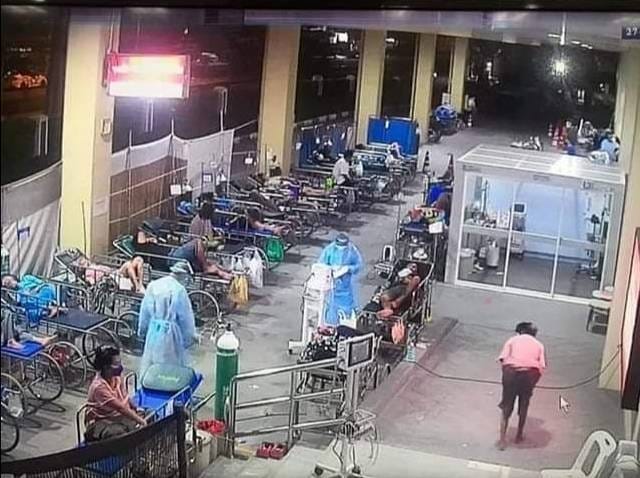


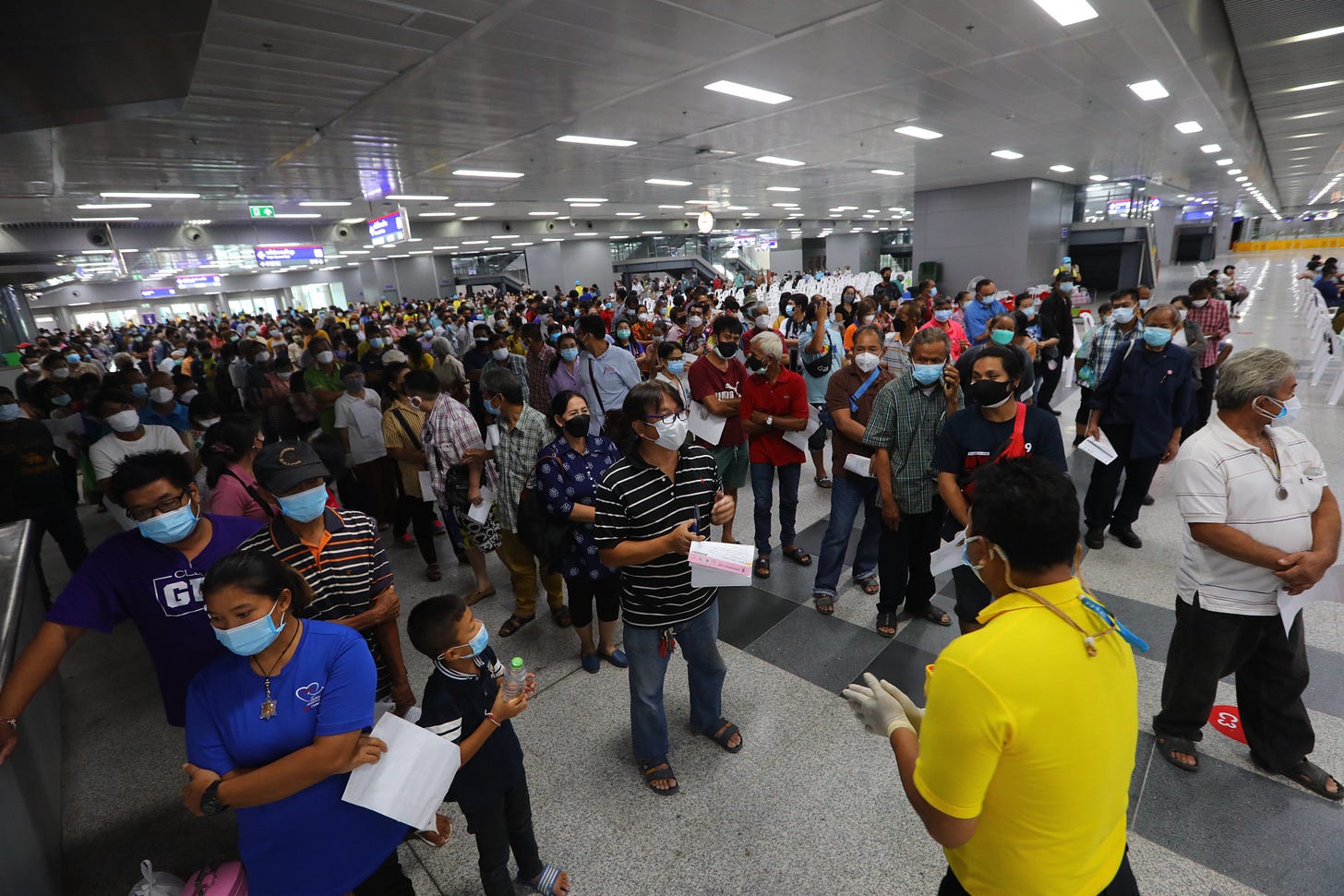
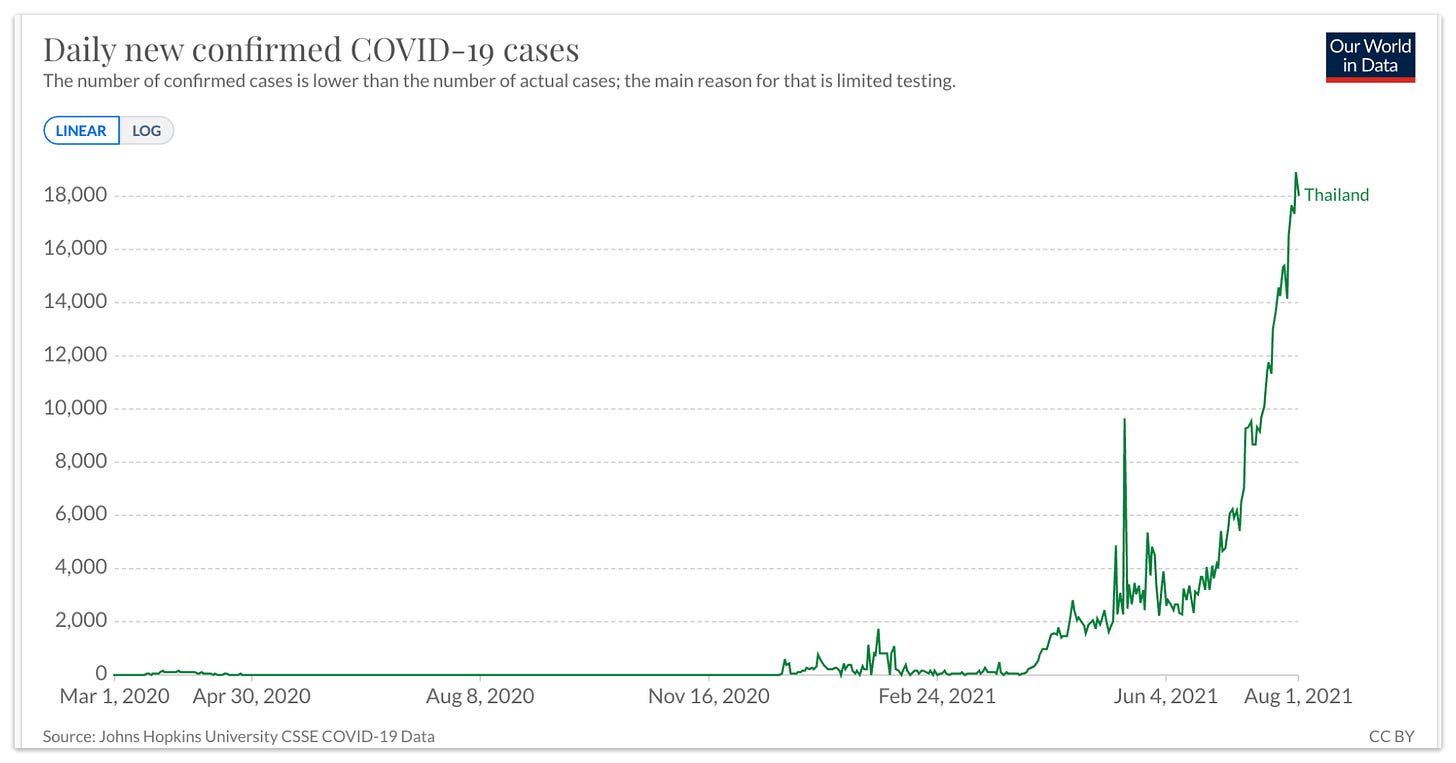
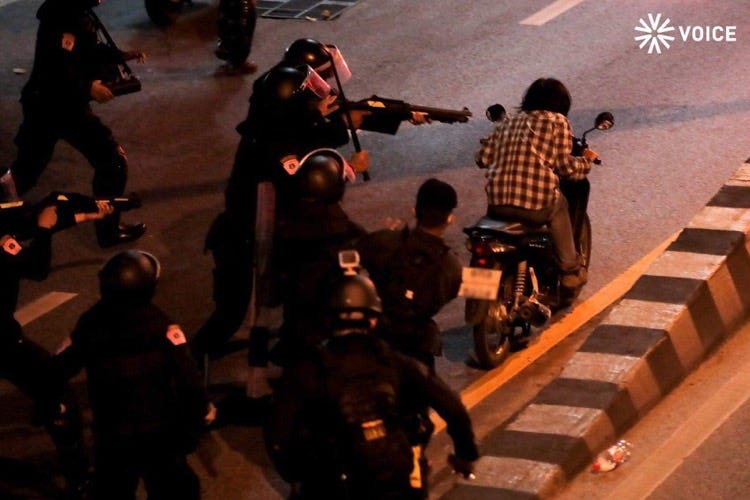
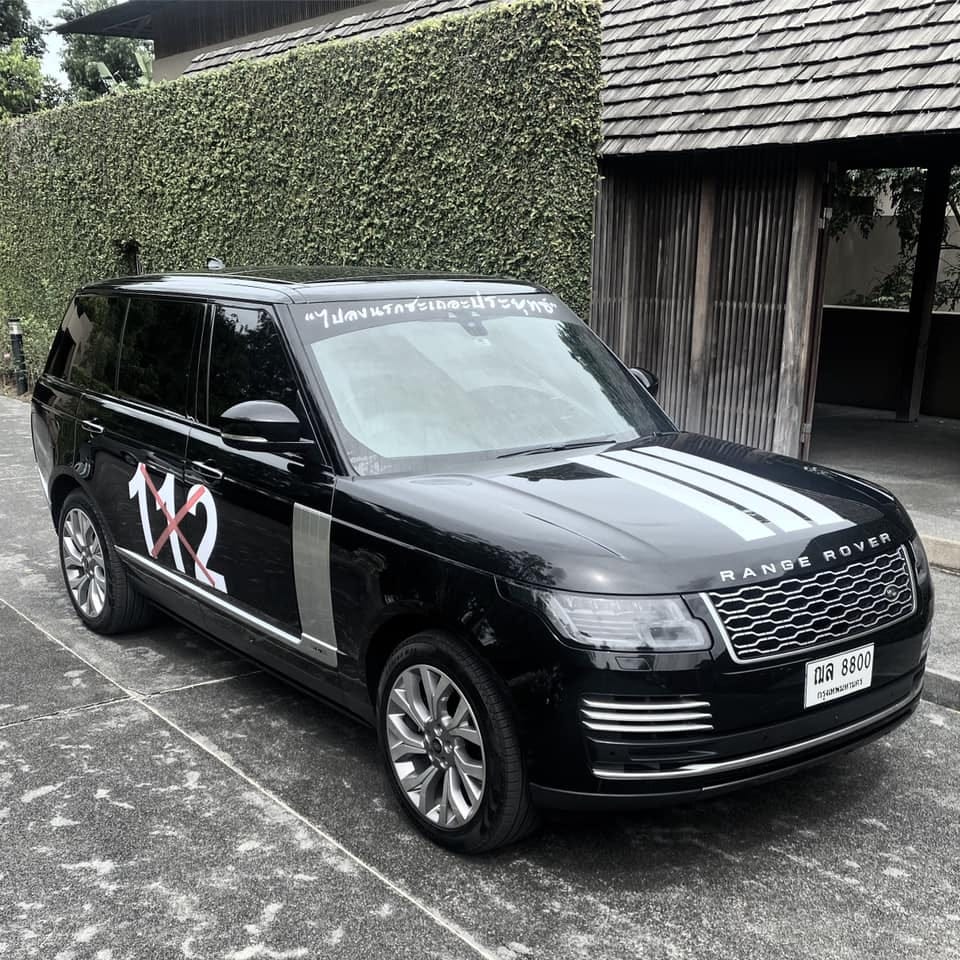

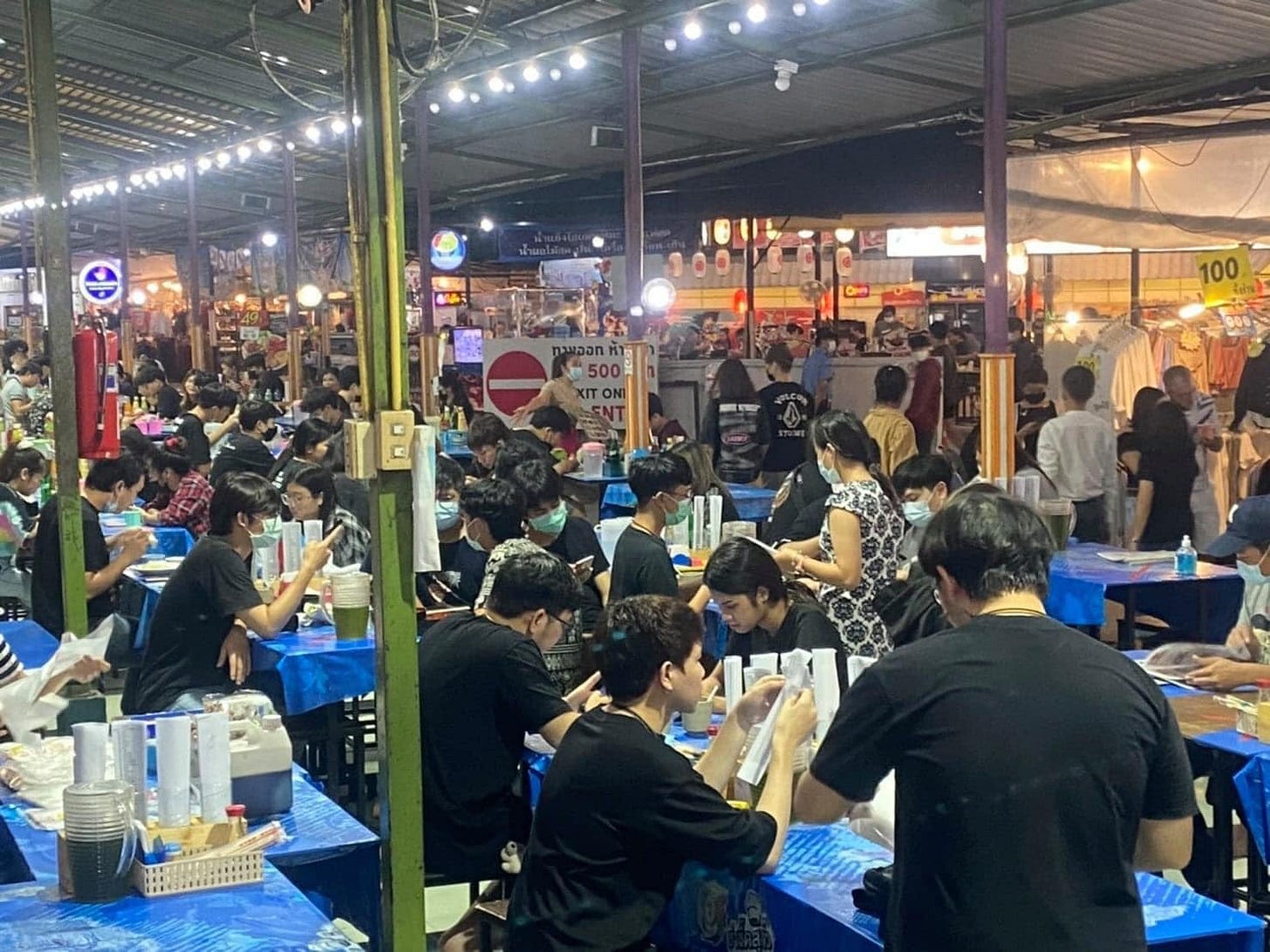
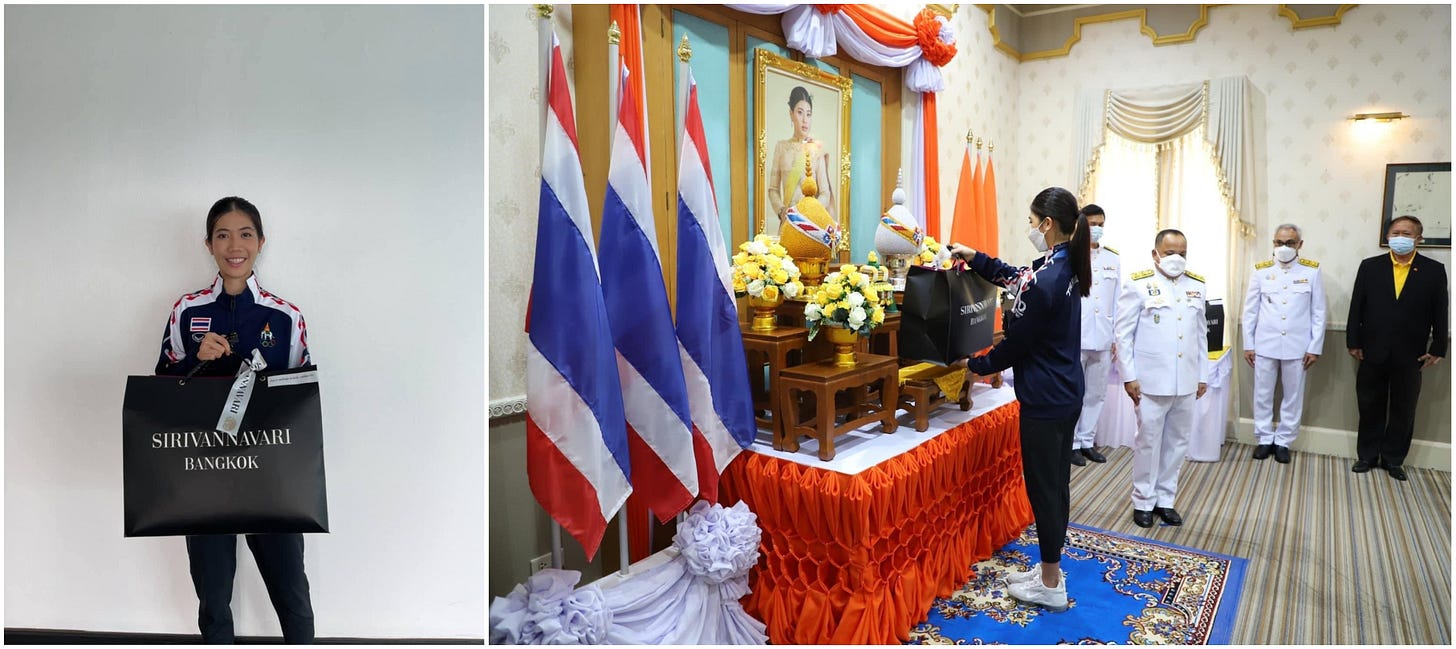
Stalin's apt comment comes to mind, "Ideas are more powerful than guns. We do not allow our enemies to have guns, so why should we allow them to have ideas?"
I certainly have noticed lots of people wearing black in photos posted on FB over the last week. I also follow lots of Thai indie musical artists. And they've been posting the three finger salute without any apparent fear. That tells me they and their audience are all on board with the democracy movement. I also find it interesting that the band Three Man Down who have had a couple of big hits had the three vertical lines as their logo for a long time - definitely since before all of this started, but they are really leaning into it now.